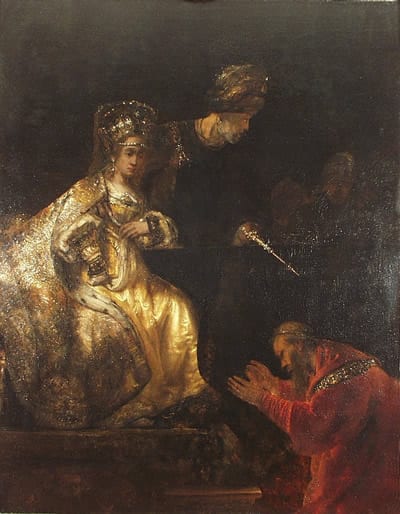
Jewish people celebrated the feast of “Purim” this week. “Purim” means “lots” in Hebrew and refers to the Persian empire’s wicked prime minister Haman’s decision to cast lots to determine when to exterminate the Jewish people (Esther 3:7). The biblical book of Esther recounts this ordeal and how divine providence, not chance, delivers the Jewish people from Haman’s attempted genocide through Queen Esther.
There is no mention of God anywhere in Esther. Even so, it is quite clear that luck or chance—casting lots—did not save the day, but self-sacrifice on the part of Queen Esther, who was herself Jewish, and God who orchestrated the deliverance. As Father Johann Roten, S.M., of the University of Dayton argues, “In the celebration of Purim the two main ethical ideas are self-sacrifice and divine intervention. These two concepts are the themes which form the book of Esther.”[1]
We see both elements in Esther 4:
And they told Mordecai what Esther had said. Then Mordecai told them to reply to Esther, “Do not think to yourself that in the king’s palace you will escape any more than all the other Jews. For if you keep silent at this time, relief and deliverance will rise for the Jews from another place, but you and your father’s house will perish. And who knows whether you have not come to the kingdom for such a time as this?” Then Esther told them to reply to Mordecai, “Go, gather all the Jews to be found in Susa, and hold a fast on my behalf, and do not eat or drink for three days, night or day. I and my young women will also fast as you do. Then I will go to the king, though it is against the law, and if I perish, I perish.” Mordecai then went away and did everything as Esther had ordered him (Esther 4:12-17; ESV).
Though she refused to go before the king initially due to the risk of life in appearing before him uninvited, Esther determines to go. Her mentor Mordecai’s words move her to action as he claims that Esther was likely placed in her position as queen by providence—“for such a time as this.” Esther responds by calling for a three-day fast before she risks her life in appearing before the king in order to advocate for her people’s deliverance.
A sense of luck or blind chance does not normally move people to sacrifice their lives for others. A keen awareness of providence and/or destiny and an overriding love for others are compelling forces that move people beyond staying put in the comfort and security of preserving their status, as found in the Book of Esther. Truly great leaders like Esther do not arise by mere chance. A sense of providence and/or destiny and concern for others outweigh their own self-preservation.
In the end, Esther won a great victory for her people in delivering them by God’s hand from Haman’s wicked scheme. Purim celebrates their deliverance. Don’t sit back and cast lots for the opportunity to become great leaders. Take small steps daily by realizing that God has placed us where we are for a purpose and that involves sacrificially considering others better than ourselves, as Paul writes (Philippians 2:3). During Lent, consider fasting for three day in view of Esther’s Fast (celebrated just before Purim earlier this week) to see how God would have you and me care for others’ well-being. Don’t leave it to chance.
_______________
[1]Father Roten references the following work in support of his claim: C. G. Montefiore and H. Loewe, A Rabbinic Anthology (New York: Schocken, 1974), pages 99-101.












